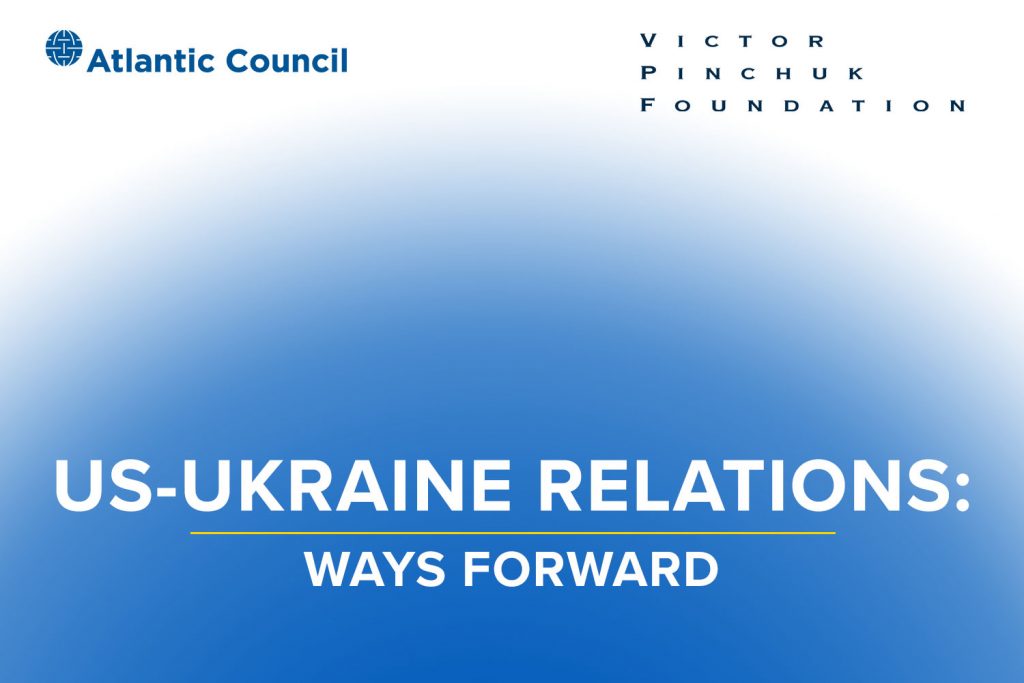Kyiv, Ukraine – The Atlantic Council and the Victor Pinchuk Foundation hosted a private Chatham House Rule roundtable discussion with a delegation of high-level former US ambassadors and government officials in Kyiv. Despite Ukraine’s recent spotlight in US domestic politics, the discussions focused on ways to further cement a strong US-Ukraine relationship, challenges that still need to be overcome, and key policy areas where both governments can focus on future cooperation and partnerships.
Ambassador April H. Foley, Former US Ambassador to Hungary; Chair of the Board, Hungary Initiatives Foundation: “The policy goals of the United States in relation to Ukraine remain unchanged. The United States is committed to the sovereignty of Ukraine. It is committed to having Ukraine further integrate with the West. And it is committed to a robust level of support to assist Ukraine in achieving these goals.”
Ambassador Daniel Fried, Former US Ambassador to Poland; Weiser Family Distinguished Fellow, Atlantic Council: “Notwithstanding the unhelpful injection of US domestic politics into relations with Ukraine, underlying support for Ukraine from Republicans and Democrats remains strong. Support for (and the danger of) a bad US-Russia deal over Ukraine’s head remains low to non-existent, despite individual voices to the contrary.”
Ambassador John Herbst, Former US Ambassador to Ukraine; Director, Eurasia Center, Atlantic Council: “Despite Ukraine’s politicization during the recent partisan fight in the United States, bipartisan support for Ukraine’s fight against Kremlin aggression remains strong in Washington.”
Ambassador Steven Pifer, Former US Ambassador to Ukraine; Nonresident Fellow, Brookings Institution; William J. Perry Fellow, Stanford University: “A successful Ukraine remains very much in the US national interest. With the Trump impeachment drama now behind us, the US-Ukraine relationship hopefully can revert to normalcy. Washington and Kyiv should look for ways to further bolster their bilateral relations.”
Mr. Victor Pinchuk, Founder, Victor Pinchuk Foundation; Founder¸ EastOne Group: “For Ukraine, the United States has been the most important strategic partner since 1991. Today, friends of Ukraine from the United States and friends of America from Ukraine from different political camps gathered here to remind each other of the importance of these relations and to look for ways forward. Currently, in connection with internal political events in the United States, some say the topic of Ukraine has become toxic in the United States. Today’s round table of our Foundation with the Atlantic Council is a first contribution to a detox program of Ukrainian-American relations.”
Ambassador Alexander Vershbow, Former US Ambassador to Russia; Distinguished Fellow, Transatlantic Security Initiative, Atlantic Council: “Six years since the start of Russia’s aggression, the Kremlin remains determined to deprive Ukraine of its sovereignty and independence and block its path to the European Union and NATO—all in flagrant contradiction with the principles of the United Nations Charter and Helsinki Final Act. Ensuring that Putin doesn’t succeed is essential to the future of the international rules-based order—that’s why Ukraine’s fight for freedom is America’s fight as well. Now is the time to discuss how the West and Ukraine can work together to increase the pressure on Moscow to end its efforts to destabilize Ukraine and achieve a diplomatic solution that restores Ukraine’s sovereignty and territorial integrity.”
Dr. Celeste Wallander, President & CEO, US-Russia Foundation: “Ukrainians need only listen to the many American voices standing up for their sovereignty and security, as well as pay attention to ongoing US policies of imposing costs on Russia for its aggression against Ukraine and illegal occupation of Ukrainian territory, to understand that many Americans know very well where Ukraine is on a map—in the heart of Europe, and exposed to Russian pressure—and care about Ukraine’s fight to remain part of a Europe whole and free. Euro-Atlantic security is American security, and none of us is safe from subversion or aggression unless Russia’s efforts to re-draw borders and chip away at international law are defeated. Ukrainians should also embrace America’s commitment to assisting Ukraine defeat corruption, because meeting Euro-Atlantic standards in good governance and transparency will advance Ukraine’s European integration and reduce its vulnerability to Russian influence.”
For interviews, please contact Natalya Vovk: Nataliya.Vovk@eastonegroup.com
For additional information, please contact Michael Newton: mnewton@atlanticcouncil.org

The Eurasia Center’s mission is to promote policies that strengthen stability, democratic values, and prosperity in Eurasia, from Eastern Europe in the West to the Caucasus, Russia, and Central Asia in the East.
